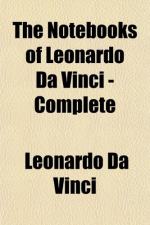[Footnote: We are led to believe that Leonardo himself was a vegetarian from the following interesting passage in the first of Andrea Corsali’s letters to Giuliano de’Medici: Alcuni gentili chiamati Guzzarati non si cibano di cosa, alcuna che tenga sangue, ne fra essi loro consentono che si noccia ad alcuna cosa animata, come il nostro Leonardo da Vinci.
5-18. Amerigo Vespucci, with whom Leonardo was personally acquainted, writes in his second letter to Pietro Soderini, about the inhabitants of the Canary Islands after having stayed there in 1503: “Hanno una scelerata liberta di viuere; ... si cibano di carne humana, di maniera che il padre magia il figliuolo, et all’incontro il figliuolo il padre secondo che a caso e per sorte auiene. Io viddi un certo huomo sceleratissimo che si vantaua, et si teneua a non piccola gloria di hauer mangiato piu di trecento huomini. Viddi anche vna certa citta, nella quale io dimorai forse ventisette giorni, doue le carni humane, hauendole salate, eran appicate alli traui, si come noi alli traui di cucina appicchiamo le carni di cinghali secche al sole o al fumo, et massimamente salsiccie, et altre simil cose: anzi si marauigliauano gradem ete che noi non magiaissimo della carne de nemici, le quali dicono muouere appetito, et essere di marauiglioso sapore, et le lodano come cibi soaui et delicati (Lettere due di Amerigo Vespucci Fiorentino drizzate al magnifico Pietro Soderini, Gonfaloniere della eccelsa Republica di Firenze; various editions).]
845.
Our life is made by the death of others.
In dead matter insensible life remains, which, reunited to the stomachs of living beings, resumes life, both sensual and intellectual.
846.
Here nature appears with many animals to have been rather a cruel stepmother than a mother, and with others not a stepmother, but a most tender mother.




